Hey, did you know that the purpose of sustainable agriculture practices is to meet society’s food and textile needs today without threatening future generations’ ability to meet their own needs?
Sustainable Agriculture: Future of Farming – All You Need to Know
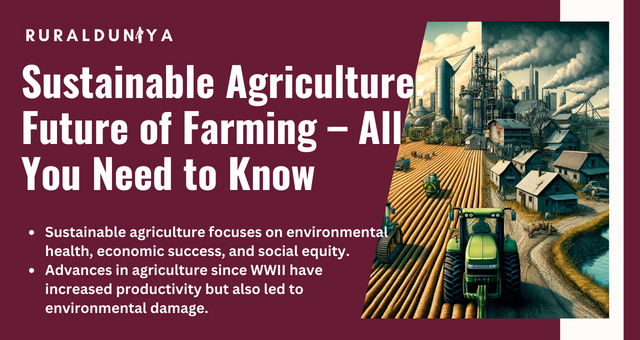
Sustainable agriculture practices aims for environmental health, economic success, and social and economic equality. Every food system participant – growers, processors, distributors, retailers, consumers, and waste managers can help preserve agriculture.
Post-World War II agriculture has changed drastically. New technology, mechanisation, chemical use, specialisation, and government regulations that maximised output enhanced food and fibre productivity.
These reforms have lowered farming risks and had many benefits, but they have also had high costs.
These include topsoil depletion, groundwater contamination, the demise of family farms, disregard of farm labourers’ living and working conditions, rising production costs, and rural communities’ economic and social breakdown.
Sustainable Agriculture Definition
In 1977, the USDA defined “sustainable agriculture” as a comprehensive system of plant and animal production practices that are specifically tailored to a particular location and are capable of being maintained over a long period of time.
It refers to the practice of farming in a manner that fulfils the current food and textile requirements of society, while also ensuring that the ability of both present and future generations to satisfy their needs is not compromised.
Sustainable Agriculture Principles
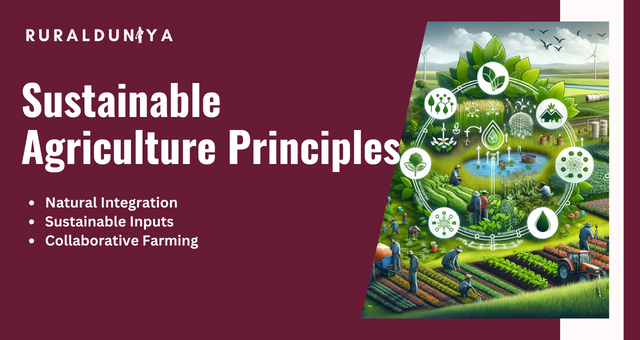
Several fundamental principles are linked to sustainability in agriculture:
- Integration of biological and ecological processes, such as cycling of nutrients, the regeneration of soil, and the fixation of nitrogen, into agricultural and food production systems.
- Utilising reduced quantities of non-renewable and unsustainable inputs, specifically those that are environmentally detrimental.
- Utilizing the knowledge and skills of farmers to efficiently cultivate the land and foster the autonomy and self sustainability of farmers.
- Resolving agricultural and natural resource issues by fostering cooperation and collaboration among individuals with diverse expertise. The issues addressed encompass pest control and irrigation.
Benefits of Sustainable Agriculture
Sustainable agriculture offers benefits that encompass all three dimensions of sustainability.
The economic benefits of it encompass:
- Reduce costs through the implementation of precision agricultural techniques.
- Improved crop productivity in sustainable farming ensures food security.
- Conserved energy by refraining from using fossil fuels wherever possible.
The benefits of sustainable farming in the social sphere include:
- Increased remuneration for local communities.
- Equality in society.
- Public health benefits from the minimum presence of chemical contaminants.
It positively impacts the ecology by:
- Preserves and safeguards natural ecosystems.
- Contributes to soil conservation by effectively mitigating soil erosion and reducing nutrient depletion.
- Effectively mitigates water contamination and reduces air pollution.
- Conserves finite resources.
Sustainable Agriculture in India
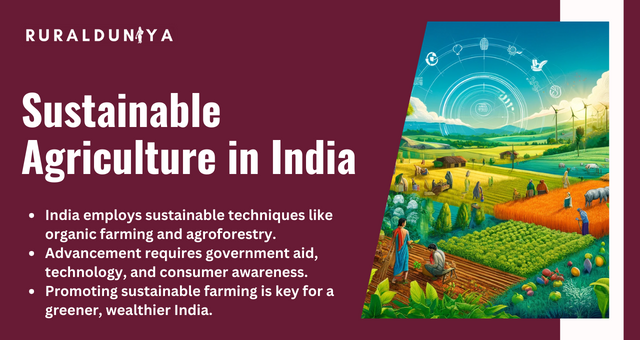
Diverse cultures and customs have made India an agricultural powerhouse for ages. Sustainable farming practices promote ecological equilibrium and rural community well-being in India.
Organic, Agroforestry, ZBNF, Precision, Crop Rotation, and Intercropping help farmers secure their livelihoods and protect the environment for future generations. Government backing, technical advances, and consumer awareness are needed to scale up these sustainable activities.
We must promote it for a greener, more affluent India as responsible citizens.
Sustainable Agriculture Practices
7 practices of sustainable agriculture are –
1. Mulching: Covering soil with wood chips to prevent erosion, preserve moisture, and eliminate weeds improves soil quality.
2. Crop Rotation: Rotating crops to maintain soil fertility and reduce insect populations, reducing pesticide use.
3. Diversified Farming: Growing crops and animals together to improve soil health and fertility without artificial fertilisers.
4. Agroforestry: Planting trees alongside crops and pastures to retain soil moisture, fertility, and erosion for nutrient-rich harvests and sustainable earnings.
5. No-Till Farming: Growing crops without disturbing the soil boosts water infiltration, retains nutrients, and encourages beneficial microorganisms, strengthening soil resilience.
6. Contour Farming: Ploughing furrows perpendicular to the slope to reduce soil erosion, increase water absorption, and increase crop yield while protecting the environment.
7. Organic Animal Raising: Free grazing on open land improves soil health and animal welfare, resulting in higher-quality products and natural fertilisation.
Importance of Sustainable Agriculture
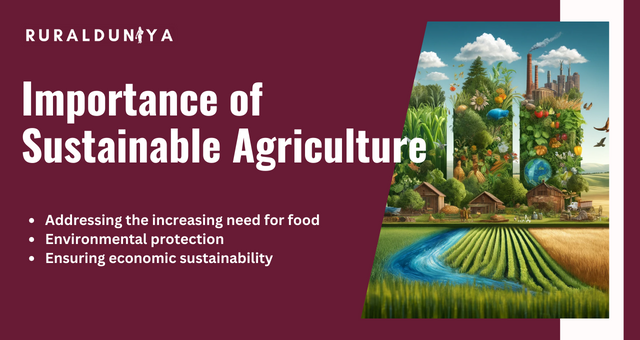
The significance of it resides in its ability to accomplish enduring objectives such as:
1. Addressing the increasing need for food: It guarantees an adequate supply of food, feed, fibre, and fuel to meet the demands of a growing population.
2. Environmental protection: It ensures the preservation of ecosystems, biodiversity, and soil fertility by preventing detrimental agricultural methods.
3. Ensuring economic sustainability: Sustainable practices help to maintain the economic viability of farmers and rural communities, guaranteeing long-term prosperity and stability.
Sustainable Agriculture Examples
Examples of sustainable agriculture are –
- Companion Planting
- Cover Crops
- Crop Rotation
- Fertility from Animals
- Hydroponic Production
- Season Extension
- Strip Grazing
National Mission for Sustainable Agriculture (NMSA)
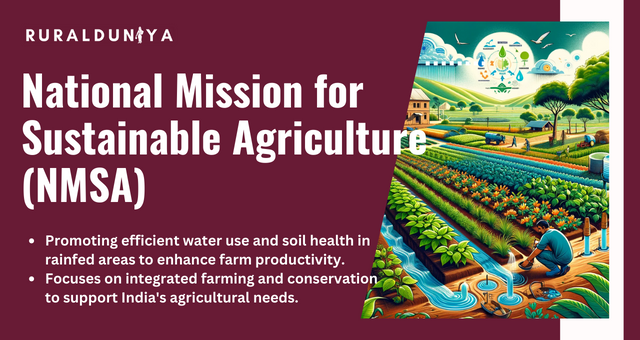
Farm productivity depends on soil and water quality and availability. Conservation and sustainable use of scarce natural resources through location-specific techniques can support agricultural growth.
Rainfed agriculture accounts for 60% of India’s net sown area and 40% of its food production. Conservation of natural resources and rainfed agriculture are the keys to meeting the country’s growing food grain need.
The National Mission for Sustainable Agriculture (NMSA) promotes integrated farming, water usage efficiency, soil health management, and resource conservation in rainfed areas to boost agricultural productivity.
Sustainable Agriculture Problems and its Impact on Agriculture
The problems and impact on agriculture manifest in various ways, including:
- A decrease in the rate of agricultural growth
- Stagnation or decline in food production
- Escalating malnutrition rates
- Reduction in the overall cultivated area
- Rising levels of environmental pollution
- Depletion of groundwater resources
- Escalating production costs
- Insufficient farm income
- Mounting unemployment rates
Concluding the Narrative
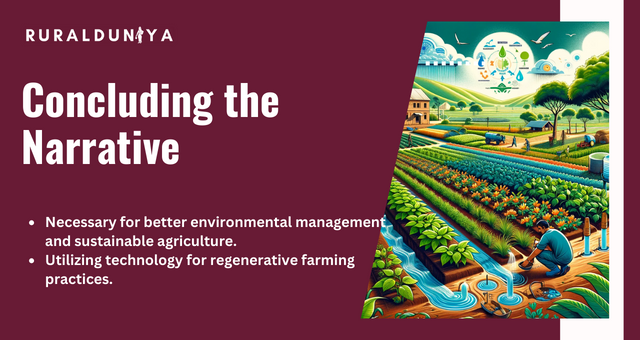
In order to establish a sustainable agriculture practices system, it is necessary to make significant policy level modifications concerning the preservation and administration of our natural environment.
Equipped with advanced technology and innovative research, we have the ability to implement comprehensive and interconnected improvements that will safeguard the environment.
Along with similar examples of sustainable development, has the potential to facilitate a regenerative approach to agriculture.
FAQs
What is the most sustainable form of agriculture?
Hydroponics is commonly employed in extensive commercial farms, particularly for cultivating lettuce and tomatoes.
What are the two types of sustainable agriculture?
Key components of it encompass permaculture, agroforestry, mixed farming, multiple cropping, and crop rotation.
Which country is best for sustainable agriculture?
Denmark: A Leader in Sustainable Agriculture
What is another name for sustainable agriculture?
Several other terms were frequently used interchangeably with or in close proximity to the term “regenerative agriculture.”
Who is the father of sustainable agriculture in the world?
Sir Albert Howard, a British botanist, is commonly recognised as the father of modern organic agriculture.

Nishank is a social impact enthusiast with a solid foundation in public policy, micro-enterprise, and agribusiness. Growing up in a farmer’s family has given him a profound connection to rural communities, fueling his passion to empower people towards self-reliance. He completed his undergraduate studies at the Delhi University and earned a master’s degree in Rural Management from National Institute of Rural Development & Panchayati Raj in Hyderabad.

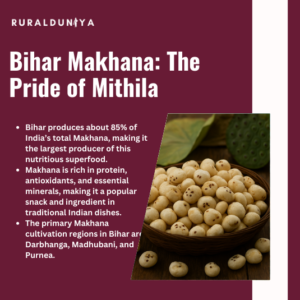
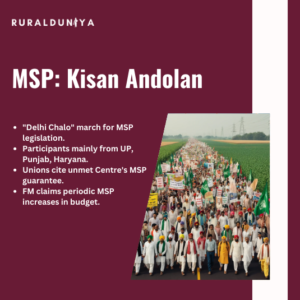
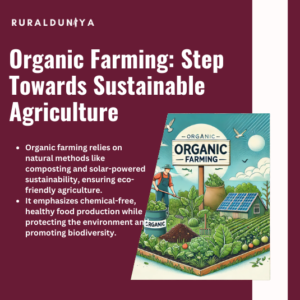
as being from Natural Farming under pm Pranam scheme how to enroll to get Subsidy from State or Central goverment being small land holder farmer in Maharashtra for use of daitomecious Erth powder as antipest or soil ammendment for remineralization of soil
As a small landholder in Maharashtra seeking subsidies for using diatomaceous earth as a pest control or soil amendment under the PM-PRANAM scheme, follow these steps-
Check Eligibility: Ensure you meet the criteria for the PM-PRANAM scheme, which promotes the use of alternative fertilizers and sustainable farming practices.
Contact Local Agricultural Authorities: Reach out to your district’s Agriculture Department or Krishi Vigyan Kendra (KVK) for guidance on available subsidies and the application process.
Prepare Necessary Documents: Gather required documents such as land ownership proof, Aadhaar card, and bank account details.
Submit Application: Complete and submit the application form as directed by the authorities.
Follow Up: Stay in touch with the officials to track your application’s status and receive further instructions.
For more information on the PM-PRANAM scheme and its implementation in Maharashtra, you can refer to the official press release by the Press Information Bureau.